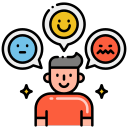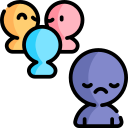Child-centered Play and Group Therapy is a mental health intervention for little kids up to the age 10. Children facing difficulties in behavior, expression, social skills, etc. find help in this therapy.
Through play and interaction with peers, children are able to express better and enhance their social skills. They are also able to showcase their emotions through the activities. Play and Group Therapy may be Directive or Non-Directive.
Play and Group Therapy has proven to benefit children with autism, anxiety disorders, PTSD, sexual abuse, and physical & emotional trauma.
Children up to the age of 10 may experience difficulties in various areas

Difficulty in following rules, aggressive behavior, or disruptive actions.

Struggles with verbalizing thoughts, feelings, and emotions.

Difficulty in forming relationships, sharing, or interacting with peers.

Through play and peer interaction, children learn to express themselves better and develop crucial social skills.

In this controlled environment, the therapist actively guides the child through activities, helping them understand and express their emotions.

In a more flexible setting, children choose activities themselves, allowing them freedom of expression with minimal therapist intervention.

Children learn healthier ways to express emotions.

A better ability to express feelings through verbal and non-verbal communication.

Enhanced skills in engaging with peers and forming healthy relationships.